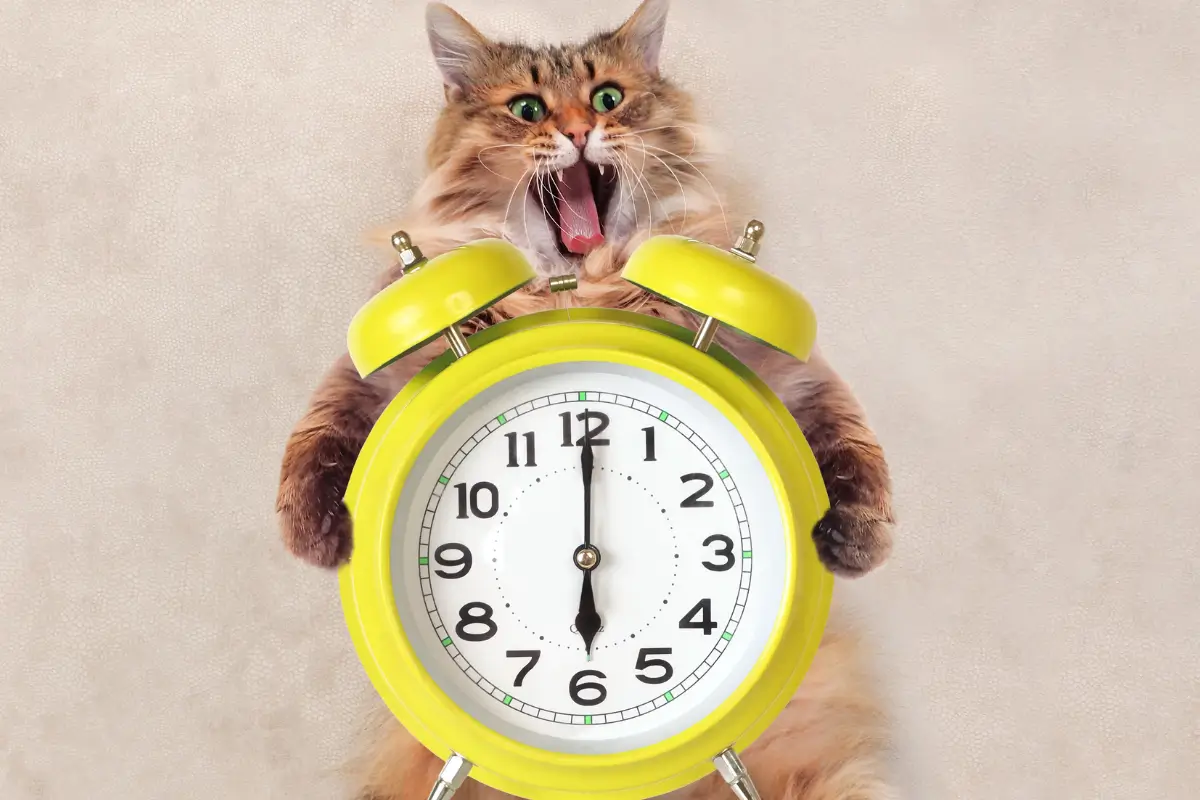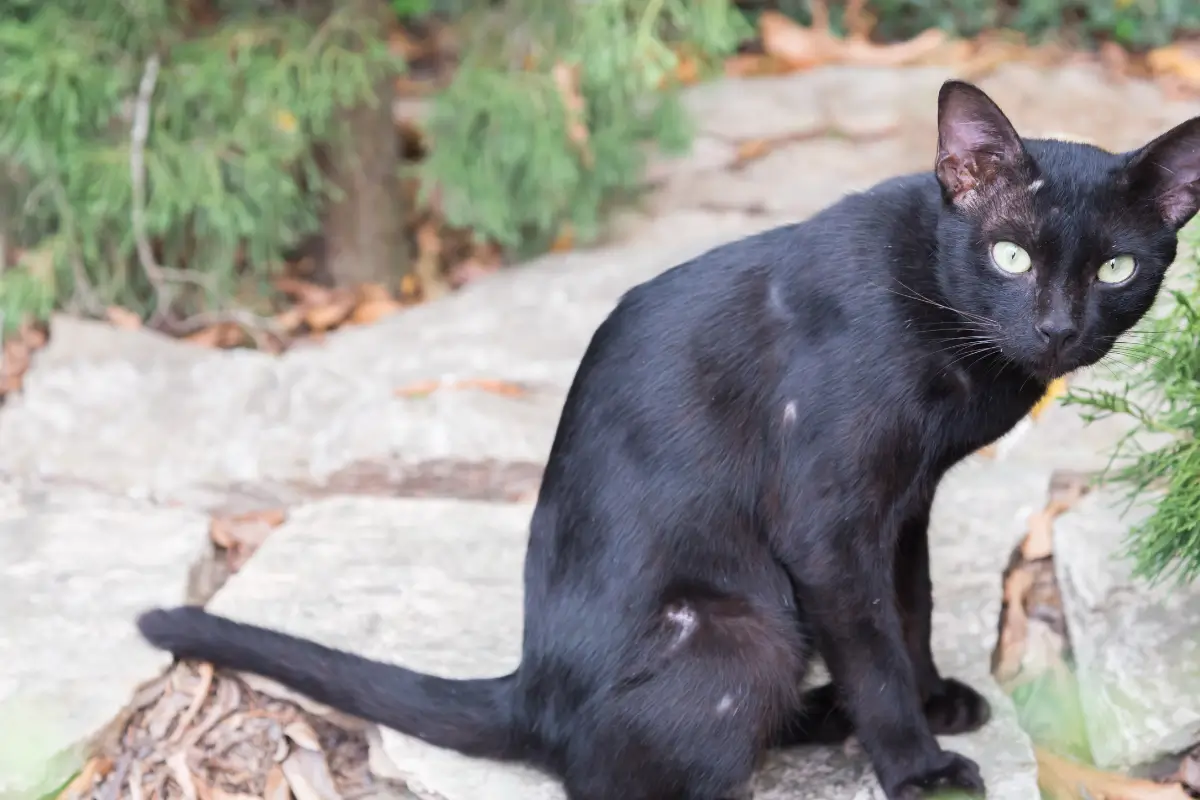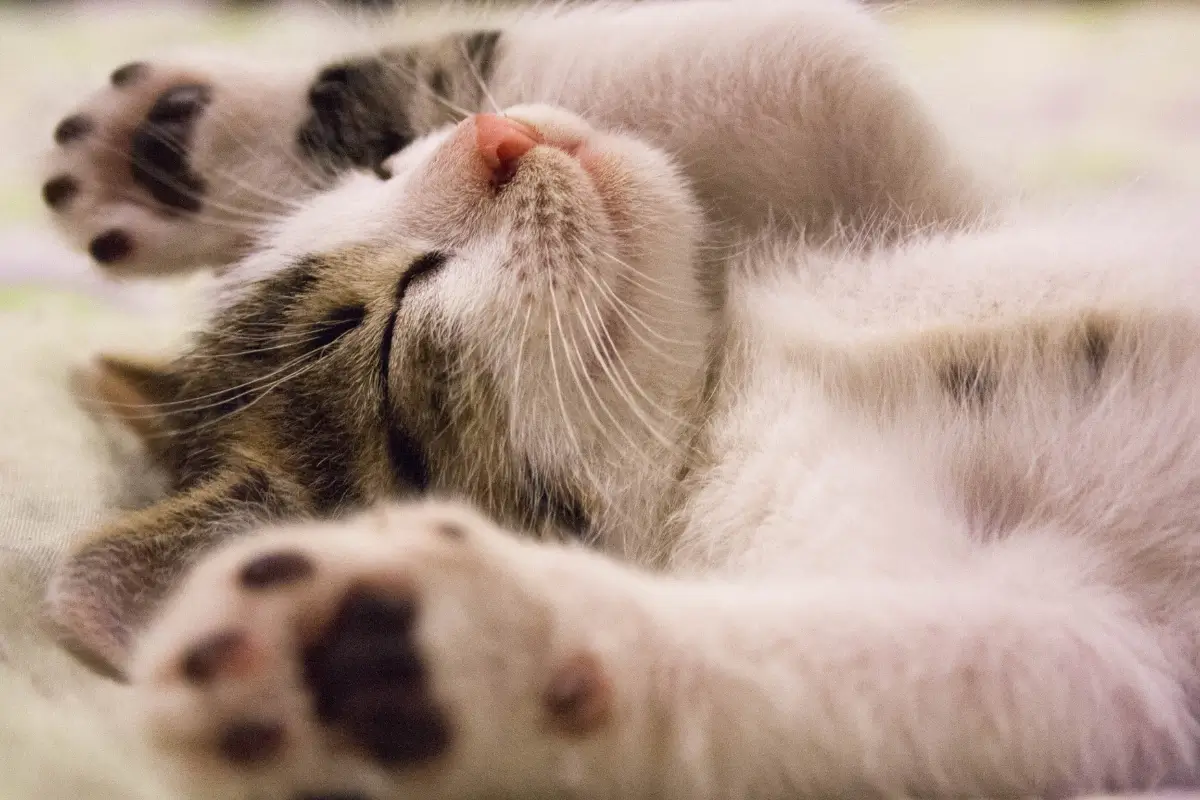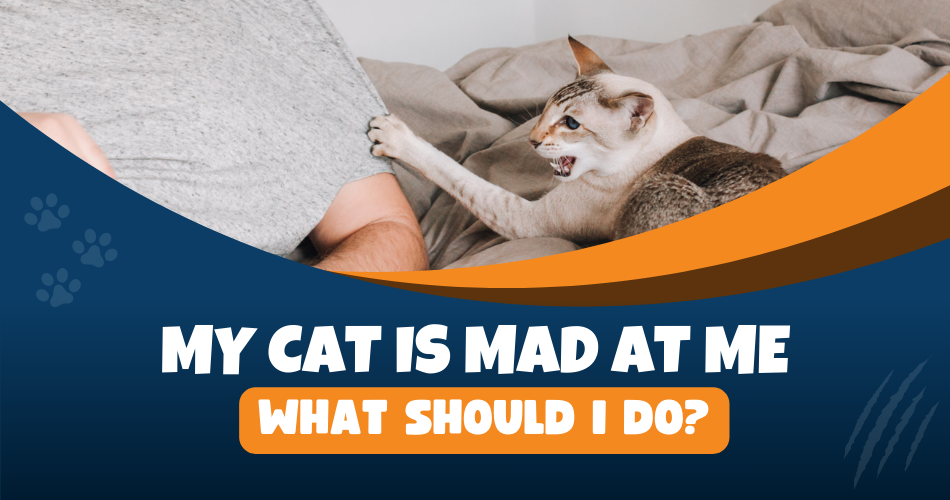Have you ever walked into your home and received the cold shoulder from your cat? Or worse, a hiss? If suddenly your sweet furry friend starts giving you a scary look, you may start wondering what went wrong. The reason is your cat is angry with you without knowing you.
For example, last week, I decided to rearrange the furniture in my living room. Little did I know that this small change would make my cat whiskers sulk and pout in the corner for days.
If you find yourself in a similar situation, wondering, “Why is my cat mad at me?” you’re not alone.
Let’s see how you can win your cat back.
When Your Cat Is Going Mad?

Sometimes, cats can suddenly start acting out. There may be no reason. Or they are anxious and depressed about something. Now your cat is behaving weirdly. These weirdo creatures can hiss, hide, or swat.
Here are some possible situations when your cat can go mad at you.
1. After A Bath
Not all cats enjoy bath time. Your cat can be one of them. If your cat is mad after having a bath, she may not like bathing. It can be stressful for her. Cats love comfort more. When they get wet, it is something out of their comfort zone. Let them have a little space to relax. Do not forcefully bathe cats.
2. After Vacation
Coming home after being away can make your cat grumpy. They might feel neglected or insecure about your absence. This is the same as how you feel about staying apart from your beloved cat for a long time. Try to spend some extra time with them.
3. After Bringing Home A Kitten
Have you brought a new kitten to your home? The possibility is high that your older cat will not welcome the kitten. He may be jealous or threatened by the new member’s presence. Also, they are not comfortable with someone new in their territory. So, make sure you give plenty of attention to your older cat. And introduce the kitten to the cat.
4. For Leaving
Cats can get upset when you’re not around because they form strong bonds with their owners. They feel lonely when you leave and show their love by acting out when you return. Leaving some clothes with your scent or giving them an interactive toy can help keep them occupied while you’re away.
How To Know If Your Cat is Upset With You?

With winning your loving cat back first, you need to know if they are upset with you or not. There is some body language or behaviors they exhibit when cats are upset. Check out these signs.
Aggression
Sometimes, your kitty shows they’re upset in a direct way. If they start swatting at you or hissing. They are saying they’re not too happy right now. For example, if you accidentally step on your cat’s tail, they might react aggressively because they’re hurt and startled.
Scratching the Furniture
Your cat is looking at you and slowly, with his paw, starting to scratch your furniture. Their claws are more than usual on the sofa or curtains. This is a sign they are bothered by something. When frustrated or stressed, cats might take it out on the furniture. Scratching can be a way for them to release tension and claim their space.
Ignoring Behavior
What can be more surprising and painful than your cat ignoring you? Yesterday, she was fighting sitting next to you and now is ignoring you. This is another way to express that your furry friend is mad at you. Your cat may not run to you when you return home or cuddle with you.
Growls With You
Growling is an unmistakable sign that your cat is not in the best of moods. When cats are happy, they purr, and when angry they growl. If your attempts at petting or playing are met with growls, it’s wise to step back and give them some space. The cat pet owners know that dogs do not growl; cats do it, too, when they are angry.
Dangerous Looking
As a cat parent, you know every look of your cat. What they try to express with their look. He is directly staring at you, puffing up their fur, arching their back, or flashing their teeth. This is a clear sign now you need to pay attention to how you can make up with your cat.
Hide Behind Something
If your cat suddenly spends a lot of time hiding behind furniture or in other spots, it could be a sign of stress or fear. Cats tend to seek out safe spaces when they’re feeling upset or scared.
Bit You When Petting
You take your cat on your lap and start petting. But she bites you hard and meow. Now, this is something unusual to you because your cat used to love you petting her. Your cat is irritated with you and does not like your touch.
Tail Twitchy
Cats show irritation with a twitching tail, unlike dogs who wag their tails when happy. If you notice this behavior, it’s best to stop and rethink what can make your cat upset.
How to Handle Your Cat’s Anger

Managing your cat’s anger means being patient, observant, and understanding. You need to pay attention to their needs and maintain a stable environment. Then, you can help ensure your furry friend stays as happy and healthy as possible. Plus, a happy cat means a peaceful home!
1. Create Calm Situations
Keep the noise down and the atmosphere calm. Cats love stability, so a predictable, quiet environment can really help soothe them. For example, maybe hold off on that rock band practice in the living room if your cat’s been on edge!
2. Take a Look at Body Language
Learn to read your cat’s body language. This can give you a heads-up when they’re feeling irritated. A lashing tail or flat ears mean ‘back off’ in cat-speak. So, if you notice these signs, give them some space.
3. Overcome Their Nervousness
Introduce new things or people slowly. If your cat hides under the bed when visitors come, let them stay there until they feel brave enough to come out. Pushing them could increase their stress.
4. Ensure a Safe and Secure Place
Every cat needs a haven. Whether it’s a cozy corner with a bed or a quiet spot on a shelf. Make sure your cat has a go-to place where no one will bother them.
5. Try to Feed It at Regular Times
Pets boom on routine. This is why feeding them at regular times makes them feel more secure. Missing a meal can make anyone grumpy, cats included!
6. Let Your Cat Come to You
Sometimes, it’s best to let your cat decide when to cuddle. If they come to sit on your lap, that’s your cue they’re feeling more sociable.
7. Give Nutritious Food
Just like humans, cats feel best when they eat well. High-quality cat food can improve their mood and overall health. This keeps those cranky moments at bay.
8. Do Not Punish It
It should go without saying, but never hit your cat. Physical punishment can lead to fear, anxiety, and more aggressive behaviors.
9. Veterinarian Checkup
If your cat’s mood changes suddenly, it might indicate health issues. Regular check-ups can catch these problems before they turn serious.
10. Check Their Health
Keep an eye on subtle signs of illness. Is your cat eating less? Do they seem unusually lethargic? Sometimes, the issue is physical, and your vet can help you figure out if there’s any health problem.
Why Is My Cat Mad At Me All of a Sudden?

Cats aren’t always the open books we wish they were. Their sudden changes in mood are usually triggered by a few common factors. Here’s why your furry friend might suddenly seem mad at you:
Loud Noises
Cats have sensitive ears and prefer a calm environment. Loud noises from fireworks, thunderstorms, or even a noisy vacuum can easily stress them out. If your home has been noisier than usual, this could be the reason behind their grumpiness.
Restriction to Anything
Cats love their freedom. They might feel frustrated if you’ve recently started keeping them out of certain rooms or blocking off their favorite hideout spots.
Prohibit Pets from Going Outdoors
Your cat may love outdoor adventures. But you have suddenly kept them indoors. You may have your own reasons, such as their health. Your cat will not understand the reasons and feel quite upset about it.
Delayed Feeding
A change in feeding times can disrupt your cat’s sense of routine. This can lead to irritation. Animals don’t like delays in their mealtime.
Aloneness
Cats can get lonely, especially if they’re used to having company. Your cat may feel discontent if you’ve been busier than usual and not spending as much time interacting with them.
How Long Does A Cat Stay Angry At You?
Even though cats don’t really hold grudges, sometimes it might seem like they do. Cats actually have a short memory, lasting about 16 hours. So they usually forget why they were mad at you after a day.
Cats are all different, so how long they stay upset can really vary. It depends on their personality, what upset them, and how you handle their mood.
They might only be grumpy for a few hours for small things that bother them, like being woken up from a nap or not loving their dinner.
If something bigger upsets them, like a noisy party, moving to a new house, or meeting a new pet, they could stay upset for a few days.
And if something upsets them, like a scary trip to the vet or being handled too roughly, it might take weeks to feel relaxed and safe around you again.
Conclusion
You know your cat very well when it gets mad and starts doing weird behavior. When a cat is upset, she may give an angry look, scratch furniture, or growl. In such a case, you will not like her ignoring you or not liking your touch.
To get your sweet, adorable cat back, try to understand why they are upset first. Then, try to fix that issue. Never try to punish them and maintain their routine. Also, give your cat enough love, time, and playtime. In the end, a happy cat is the most important for you.

